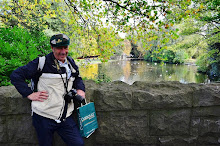WATKIN STREET, WHO KNEW
It’s maybe a reflection of the inner suburbs of Sydney that
people seemingly aren’t that interested in either the historic architecture or
the large body of street art, yet, when I’ve posted photos, the opposite seems
to be the case.
Again, with no agenda, I ventured west, probing, looking and
eventually finding satisfaction up a side street called Watkin. No surprise that I hadn’t heard of it; apart
from Wilson Street, hardly anyone knew any of the streets I’d been
photographing. In fact, when I later
sent some pictures of Watkin to the lady who owns my house sit, she was aghast
that she proudly went looking for the architecture yet had never been to
Watkin, just six blocks away.
The sheer delight of the daily discoveries could not be
over-estimated. The patterns of the
pristine wrought iron (these days aluminium) work, variety of exterior colours,
the 100 year old trees that lined the streets, amazing attempts at some sort of
a garden and the extraordinary paintings that popped up in the most unlikely
places, often down back alleys hardly visited by any humans except maybe the
garbage collectors, were all lures that had me biting.
Being on a bike was, in itself, a distinct advantage because
some lanes are so narrow that cars wouldn’t even get down there and some art
works are beside walkways in public park areas.
It’s one of the great disadvantages of the housing in the area that car
parking, if possible, is very limited.
Then there’s the tiny laneways that are closed off to
vehicular traffic where people have put pot plants and rustic artwork all along
one side. The urge for beautification
seems ingrained in the human psyche.
Crossing from one area to the next sometimes entailed going
through Sydney University, whose own structures are architecturally significant,
modelled as they were on that shrine of learning, Oxford. It was overkill.
So it came to pass that I turned up this obscure road down
the way from my digs in Eveleigh called Watkin.
Tucked in behind the significant paper barks and spotted gums were Greek
style Ionic columns supporting decorative curved balconies and, above, on the
verandah, were beautiful coloured-glass semicircular windows gracing these
treasures of 19th C Victorian architecture. Here and there in their tiny yards a modicum
of greenery and a couple of tall palm trees with their slender trunks reaching
skywards stood out.
Still, getting a picture without a parking sign, car,
unwanted growth or the obligatory garbage bin was, at times, nigh on
impossible.
By the time I reached the top of the hill I realised I’d
just been somewhere special, vindicated by the later discovery that it’s
Newtown’s number one rated street.







0 Comments:
Post a Comment
<< Home